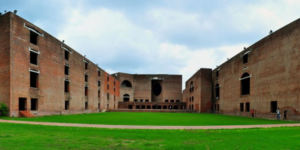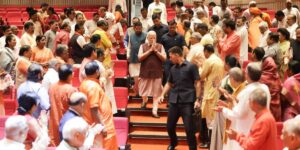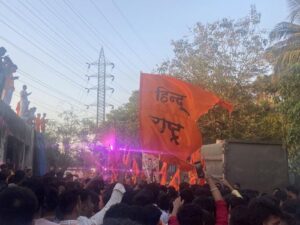Avijit Pathak
“Most learning happens casually, and even most intentional learning is not the result of programmed instruction,” said Ivan Illich.
It is not easy to remain secure with power. The intoxication of power breeds insecurity. And hence, it is not surprising that each regime of power has its own discourse of education through which it seeks to shape, modulate and control the way people think and perceive the world. At this moment of Indian history, when the proponents of the ruling ideology are hyper-enthusiastic about their mission, centred on the doctrine of some sort of religious nationalism, it is quite obvious that they too would feel tempted to curb alternative modes of thinking.
As formal or institutionalised education has acquired tremendous significance in the age of modernity, the official curriculum often becomes a subject of contestation.
There seems to be no escape from the ongoing politics of “what is worth teaching”. The eyes of the establishment, therefore, observe the NCERT school texts, delete the “irrelevant” content, and now as the episode of the Delhi University indicates, even the reading material of courses in sociology, history, political science and English literature cannot be spared.
The message is clear. Delete everything that is “objectionable”. Hence, as we are asked to believe, the stories of Gujarat and Muzaffarnagar riots are objectionable as they “hurt” people’s sentiments. Or for that matter, Marxism or Maoism is dangerous and it is not a good idea to show Hindu gods as members of the LGBT community!
It is not difficult to make sense of this phenomenon. Enough has already been said about education as an ideological apparatus. We also know the role of education in consolidating the ruling class’s hegemony. And it is also clear that extremist ideology of any kind (be it Left or Right) is burdened with the dogma of certainty. It is, therefore, inherently against the spirit of plurality, epistemological anarchy and creative voices. While Stalin hated Trotsky, Adorno could not work in Hitler’s Germany, and given a chance the likes of Pragya Thakur would like to ban the books of Mahatma Gandhi.
Not solely that. The insiders know that even academic priestcraft is no less dogmatic. For instance, even under normal circumstances, those who are extremely powerful as experts in their respective disciplines play their own politics of inclusion and exclusion. For instance, if you teach field work to undergraduate sociology students of Delhi University, is it necessary that you have to keep glorifying M.N. Srinivas and Andre Beteille and their “village studies”?
Or is it easy to include, say, Gandhi’s Hind Swaraj rather than Anthony Giddens’s The Consequences of Modernity in a paper on sociological theories? The entire process of making the reading list—what to include, and what to exclude—is never an innocent, value-neutral process. Not merely the political class, even the academic bosses love to condition the mind.
But then, the question I ask is whether it is still possible for a teacher or a student to retain her creative agency, see beyond the official syllabus, and engage in a creative process of unlearning for deconditioning the mind.
The art of unlearning
Rabindranath Tagore had said, “The fact that we exist has its truth in the fact that everything else does exist, and the ‘I am’ in me crosses the finitude whenever it deeply realises itself in the ‘Thou art’. The crossing of the limit produces joy, the joy that we have in beauty, in love, in greatness.”
Even though in the life of a student or a teacher, the heavy baggage of the official syllabus puts enormous pressure, I would still insist that there is surplus in human consciousness, and it is not altogether impossible to unlearn the prescribed texts, and trust what one actually sees, experiences and realises. Furthermore, as a teacher, I have realised that even under the most hostile circumstances and structural constraints, our creative agency remains alive, if we are really eager to ignite it.
Imagine a situation. The official syllabus does not want you to learn about Gujarat or Muzaffarnagar riots. But then, two things are still possible. After delivering a lecture on the prescribed text, the teacher can still take the remaining ten minutes, and invite the students to the world of Saadat Hasan Manto. Say, the heart-breaking story of Sakina revealing the wound of partition: what it meant to move from Amritsar to Lahore, and experience the horror of brute masculinity and gendered violence implicit in the discourse of communalism and religious nationalism.
It may motivate the young minds to explore further, and eventually discover Urvashi Butalia’s The Other Side of Silence in a book shop in Old Delhi , even if it is not part of the syllabus.
This is what I did as a student. I kept reading Franz Kafka‘s stories and novels, and understood the discontents of modernity, even though the syllabus wanted me to read The Structure of Social Action by Talcott Parsons. Well, Louis Dumont was in the syllabus, but then none could prevent me from reading Premchand, and becoming more sensitive to the caste question.
Or, for that matter, if the students are encouraged to evolve a profound art of seeing and experiencing, they would overcome the ‘otherness’ of the field, see the street children begging in posh Gulmohar Park in New Delhi, construction workers ruthlessly exploited by the politician–contractor mafia and poverty in the ghettoised Muslim colonies. Even if the official syllabus speaks of peace, economic growth and equality, you would never take it seriously. In other words, you would gain the courage to laugh at the syllabus.
I give tremendous importance to this capacity to see the limits to bounded knowledge. It is sad that we have killed the imagination of teachers by reducing them to mere task masters merely completing the syllabus and dictating the notes for the exams; it is pathetic that we love to restrict the vibrancy of the young mind.
At times, it shocks me when even at the stage of doctoral work, a researcher is forced to write the synopsis in a standardised format. As a result, ideas disappear; there is no catharsis, and what remains is only the anxiety whether the section on research questions should come before research objectives; or whether ethnography or ‘snow ball sampling’ would be part of the methodology. The ritualisation of academic life is the enemy of creativity.
Yes, the mind, conditioned by the official syllabus, the ruling ideology and the academic ritualism, needs to be liberated: the way Tagore accomplished it, Illich fought for it, and Krishnamurti reflected on it. This is the art of unlearning. This is the moment of awakening and liberation.
Yes, Delhi University students and teachers—your creative struggle has just begun.
(Avijit Pathak is professor of Sociology at Jawaharlal Nehru University.)




